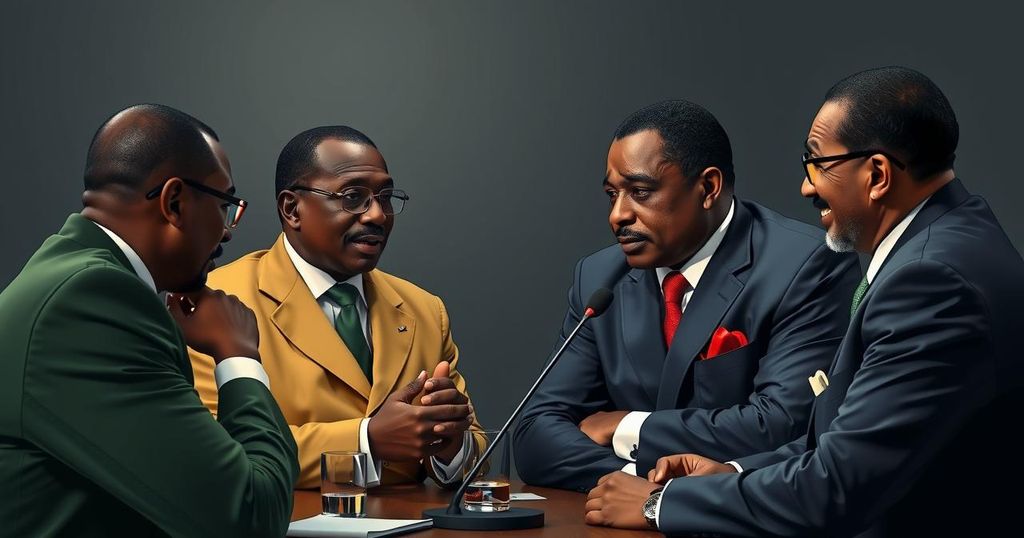Politics
AFFAIRS, AFRICA, BARACK OBAMA, BBC, CONGO, CONSTANT MUTAMBA, CORRUPTION, DEMOCRACY, DEMOCRATIC REPUBLIC OF CONGO, EUROPE, FELIX ANTOINE TSHISEKEDI, GERMANY, HUMAN RIGHTS, INTERNATIONAL DEVELOPMENT COOPERATION AGENCY, KAYIKWAMBA, KW, KWAME NKRUMAH, LEADERSHIP, LUMUMBA, M23, MUNZENZE PRISON, NKRUMAH, PATRICK LOCH OTIENO, PAUL KAGAME, PL, PLO, POLICE DEPLOYMENT, THERESE KAYIKWAMBA, UNION GOVERNMENT
Fatima Khan
0 Comments
Reflections on the Leadership Crisis in the Democratic Republic of Congo
The DRC faces deep-seated issues of leadership and ethnic division as ministers make incendiary statements exacerbating tensions. PLO Lumumba and Kwame Nkrumah’s critiques point to a historical pattern of governance failures, calling for a reevaluation of unity and inclusiveness in the country.
In the analysis of the Democratic Republic of Congo’s (DRC) challenges, PLO Lumumba poignantly characterizes its narrative as one fraught with sadness. This sentiment resonates with Kwame Nkrumah’s assertion that the future of the DRC rests solely in the arms of a united Africa through a continental Union Government. Current leadership actions, particularly statements from Minister of Justice Constant Mutamba and Minister of Foreign Affairs Therese Kayikwamba, underscore the ethnic divisions and governmental shortcomings affecting the nation.
Mutamba’s comments in a video, urging inmates to assist in his ambitions to arrest Rwandan President Paul Kagame while threatening M23 supporters with execution, illustrate a troubling approach to governance rooted in ethnic animosity. Such rhetoric exacerbates pre-existing tensions within the DRC, raising concerns among human rights advocates regarding President Felix Tshisekedi’s discriminatory policies against the Congolese Tutsi community. Kayikwamba’s dismissal of M23 members as “so-called Congolese” further complicates the discourse surrounding national identity and belonging, especially as she comes from an immigrant background herself.
The underlying issue plaguing the DRC is encapsulated in Nkrumah’s commentary on the persistent failure of leadership since the assassination of Patrice Lumumba. He perceives figures such as Joseph Kasavubu and Mobutu Sese Seko as traitors who compromised the nation’s sovereignty. Nkrumah describes Congo’s leadership as being mere pawns of colonial powers, a sentiment echoing through the years up to Mobutu’s regime. Although Mobutu, associated with a unifying slogan of national identity, engaged in various forms of manipulation, his era is nostalgically compared against contemporary leadership that many citizens find lacking.
The Democratic Republic of Congo has been embroiled in a web of political and ethnic tensions since its independence. The assassination of its first Prime Minister, Patrice Lumumba, marked the beginning of a series of governance failures attributed to leaders whose allegiance lay more with foreign powers than with the Congolese people. The ongoing conflict with Rwandan forces and the internal divisions among ethnic groups, particularly concerning the Tutsi population, have highlighted the inadequacies of current governance. Leaders like PLO Lumumba and Kwame Nkrumah have voiced concerns about the state of leadership and national unity in the DRC, identifying a correlation between poor leadership and the country’s troubles.
In summary, the Democratic Republic of Congo is navigating a profound crisis of leadership that has left its people divided and disillusioned. Current ministers’ inflammatory statements highlight a political environment rife with ethnic discord, undermining both national unity and human rights. Kwame Nkrumah’s insights, particularly regarding leadership failures since Lumumba, underscore the imperative for a reformed governance structure that fosters cooperation and inclusivity among all Congolese, fostering hope for a unified future.
Original Source: www.newtimes.co.rw




Post Comment